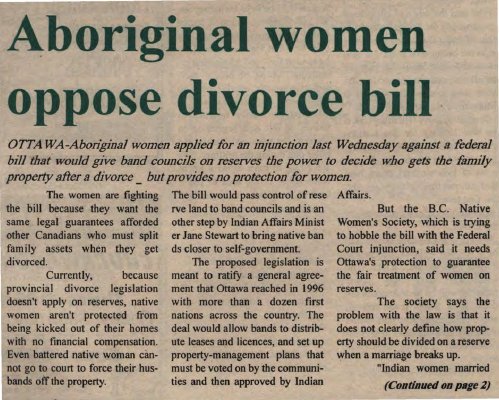"Aboriginal women oppose divorce bill"
- Publication
- Turtle Island News, 17 Jun 1998, pp.1-2
- Full Text
- Aboriginal women oppose divorce bill
OTTAWA - Aboriginal women applied for an injunction last Wednesday against a federal bill that would give band councils on reserves the power to decide who gets the family property after a divorce but provides no protection for women.
The women are fighting the bill because they want the same legal guarantees afforded other Canadians who must split family assets when they get divorced.
Currently, because provincial divorce legislation doesn't apply on reserves, native women aren't protected from being kicked out of their homes with no financial compensation. Even battered native woman cannot go to court to force their husbands off the property.
The bill would pass control of reserve land to band councils and is an other step by Indian Affairs Minister Jane Stewart to bring native bands closer to self-government.
The proposed legislation is meant to ratify a general agreement that Ottawa reached in 1996 with more than a dozen first nations across the country. The deal would allow bands to distribute leases and licences, and set up property-management plans that must be voted on by the communities and then approved by Indian Affairs.
But the B.C. Native Women's Society, which is trying to hobble the bill with the Federal Court injunction, said it needs Ottawa's protection to guarantee the fair treatment of women on reserves.
The society says the problem with the law is that it does not clearly define how property should be divided on a reserve when a marriage breaks up.
"Indian women married
(Continued on page 2)
Divorce Opposed(Continued from front page)
to Indian men have no law to protect their rights," Teressa Nahanee, a member of the B.C. group that brought the case forward, said.The legislation says that bands are required to deal with the matter, and they can't discriminate. But it sets no standards and outlines no appeal process for divorce cases on reserve which aren't covered by the provincial laws that determine how family assets are split in every other Canadian divorce case.
In 1986, the Supreme Court ruled that provincial law on the division of marriage property did not apply to reserves that are ruled by the Indian Act. The trouble is that the Indian Act is silent on the issue of divorce. So the Supreme Court decision created a legal vacuum that Ottawa has failed to fill.
The matrimonial-land issue is another example of gender equality clashing with self-government and the archaic Indian Act. For years, native women fought a high-profile campaign to regain Indian status that was stripped form them when they married non-native men.
Even Bill C-31, the government's 1995 solution to help women who lost their status, carries its own gender inequalities -- a second-generation cutoff rule means some of the grandchildren of Bill C-31 women don't qualify as Indian.
The closest that Indian Affairs has come to trying to solve the land issue was an announcement from Stewart last week that someone will be appointed to study options.
"In this time of partnership, the minister and the department don't want to make an arbitrary decision," said Kerry Kipping, a resource director with Indian Affairs.
The injunction, which could be heard as early as Monday, would stop the federal government from implementing the law by preventing it from signing the necessary agreements with reserves.
The injunction may give the Federal Court time to hear the B.C. group's case, which it launched last year, arguing that Ottawa is failing to protect women on reserves and that the new land-management agreements violate gender quality under the Charter of Rights and Freedoms.
- Media Type
- Text
- Newspaper
- Item Type
- Clippings
- Publisher
- Turtle Island News
- Place of Publication
- Six Nations of the Grand River, ON
- Date of Publication
- 17 Jun 1998
- Subject(s)
- Personal Name(s)
- Stewart, Jane ; Nahanee, Teressa ; Kipping, Kerry.
- Corporate Name(s)
- Indian and Northern Affairs Canada ; B. C. Native Women's Society ; Supreme Court of Canada.
- Local identifier
- SNPL004902v00d
- Language of Item
- English
- Geographic Coverage
-
-
Ontario, Canada
Latitude: 45.42094 Longitude: -75.69029
-
- Creative Commons licence
 [more details]
[more details]- Copyright Statement
- Public domain: Copyright has expired according to Canadian law. No restrictions on use.
- Copyright Date
- 1998
- Copyright Holder
- Turtle Island News
- Contact
- Six Nations Public LibraryEmail:info@snpl.ca
Website:
Agency street/mail address:1679 Chiefswood Rd
PO Box 149
Ohsweken, ON N0A 1M0
519-445-2954



